Battle: Los Angeles/Skyline
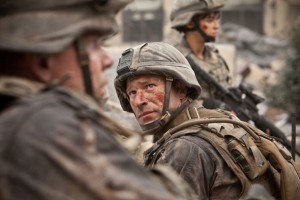 It’s nearly impossible not to feel sorry for someone who is only made aware that they’ve lost their job through the press. It happens with TV actors all the time, the only way they know that their show has been canceled is when they read about it in Variety or see a report on an entertainment “news” equivalent on TV. I used to have a job at a very famous arena for musical performance (the best way to get to this place is practice, practice, practice) where I had to read all of the local newspapers and magazines every morning, noting when said institution appeared in print. I would then send a report to my boss who would cobble together a very cutesy email to the entire company, reveling in all of the mentions of this famous place. Pointless? Probably. Soul crushing? Absolutely. Outdated? Happily.
It’s nearly impossible not to feel sorry for someone who is only made aware that they’ve lost their job through the press. It happens with TV actors all the time, the only way they know that their show has been canceled is when they read about it in Variety or see a report on an entertainment “news” equivalent on TV. I used to have a job at a very famous arena for musical performance (the best way to get to this place is practice, practice, practice) where I had to read all of the local newspapers and magazines every morning, noting when said institution appeared in print. I would then send a report to my boss who would cobble together a very cutesy email to the entire company, reveling in all of the mentions of this famous place. Pointless? Probably. Soul crushing? Absolutely. Outdated? Happily.
Now one would simply have to do a web search on each publication’s site and could be done in 15 minutes instead of the three hours of panicked cramming I had to do, because at the time, websites weren’t considered trustworthy sources, especially for daily papers. One thing that made it frustrating was that my predecessor had all day to read the papers, and they hired me to cut it down to just the morning so I could help them with clerical work. When I heard how he found out how he was fired, at first I thought it was funny. Then, after working there a few months, it sounded like a relief. Basically, bored out of his mind and scrambling to find a new job, he scanned through the help wanted section… Only to find that his own position was being advertised.
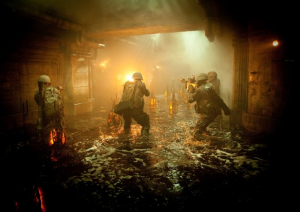 A similar situation happens early in Jonathan Liebesman’s Battle: Los Angeles, as soldiers learn they’re officially going to war because they see it on CNN. I felt for them, these fictional people, and that was pretty much the last time I worried about the characters.
A similar situation happens early in Jonathan Liebesman’s Battle: Los Angeles, as soldiers learn they’re officially going to war because they see it on CNN. I felt for them, these fictional people, and that was pretty much the last time I worried about the characters.
It was about 20 minutes into the film when I, officially, started being concerned about the actors. Not because they were in danger from the CGI aliens blasting the titular city around them, or because basic training for the film in order to become convincing members of the Marines must have been tough.
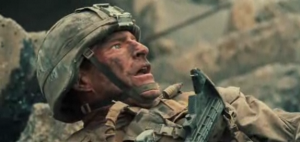 No, I felt sorry for them because Battle: Los Angeles doesn’t really require any characters, and no doubt there were hundreds of actors who auditioned and re-auditioned for roles, pinning their hopes on getting even a line in a $100 million blockbuster, when the perfunctory dialogue, already a concession when making a generic disaster movie, could have been performed by just about anybody.
No, I felt sorry for them because Battle: Los Angeles doesn’t really require any characters, and no doubt there were hundreds of actors who auditioned and re-auditioned for roles, pinning their hopes on getting even a line in a $100 million blockbuster, when the perfunctory dialogue, already a concession when making a generic disaster movie, could have been performed by just about anybody.
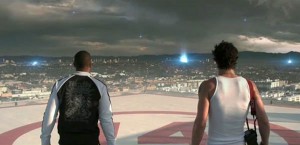 That was probably the idea behind Skyline, a quickie alien invasion movie thrown together by brothers Colin and Greg Strause, released in November (and on DVD March 22nd), as they worked on the visual effects for Battle: Los Angeles. Skyline has a lot of TV actors going through the motions (Donald Faison, Eric Balfour, Brittany Daniel) and one TV actor (David Zayas from Dexter) giving a performance that is so spectacularly amateurish that it renders moot all of the other major problems the movie has. Time wasn’t spent on anything but the effects in Skyline (the script has Faison running a wildly successful business in… visual effects, trying to entice his childhood friend Balfour to join him, quite a stretch for the brothers), but the effects are occasionally striking, especially with the variations on light blue lights that the aliens and their ships emanate. There’s a sense of the aliens as actual beings and even a creepy look inside their ship.
That was probably the idea behind Skyline, a quickie alien invasion movie thrown together by brothers Colin and Greg Strause, released in November (and on DVD March 22nd), as they worked on the visual effects for Battle: Los Angeles. Skyline has a lot of TV actors going through the motions (Donald Faison, Eric Balfour, Brittany Daniel) and one TV actor (David Zayas from Dexter) giving a performance that is so spectacularly amateurish that it renders moot all of the other major problems the movie has. Time wasn’t spent on anything but the effects in Skyline (the script has Faison running a wildly successful business in… visual effects, trying to entice his childhood friend Balfour to join him, quite a stretch for the brothers), but the effects are occasionally striking, especially with the variations on light blue lights that the aliens and their ships emanate. There’s a sense of the aliens as actual beings and even a creepy look inside their ship.
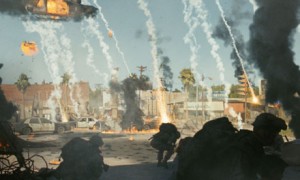 Battle: Los Angeles has none of that, no sense of awe, nothing visually overwhelming, just a lot of gray and smoke and muted explosions. The aliens are little more than metallic exoskeletons firing weapons, with some sort of gooey creature that we never really get a good look at underneath. The glimpse we do get provides the film with its best worst line, as civilian Bridget Moynahan tries to help Aaron Eckhart, the hardened military veteran on his last days before retirement, figure out where the aliens are most vulnerable. As his frustration builds, jabbing sharp objects into each layer of mush, Moynahan solemnly offers, “maybe I can help. I’m a veterinarian.”
Battle: Los Angeles has none of that, no sense of awe, nothing visually overwhelming, just a lot of gray and smoke and muted explosions. The aliens are little more than metallic exoskeletons firing weapons, with some sort of gooey creature that we never really get a good look at underneath. The glimpse we do get provides the film with its best worst line, as civilian Bridget Moynahan tries to help Aaron Eckhart, the hardened military veteran on his last days before retirement, figure out where the aliens are most vulnerable. As his frustration builds, jabbing sharp objects into each layer of mush, Moynahan solemnly offers, “maybe I can help. I’m a veterinarian.”
E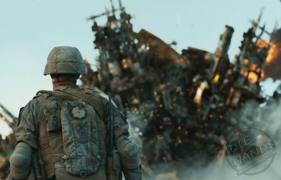 ckhart, who this week while promoting Battle: Los Angeles on Craig Ferguson’s show, announced without fanfare that this was his last movie, isn’t given more to do than to be the grizzled and scarred Sergeant, still haunted by his men’s casualties on previous missions, there’s no outside life at all for him. So as he begins to take over a ragtag, uniformly noble, racially diverse group (though I admit I didn’t see a Native American amongst the 8 or 9 we meet) on a mission to evacuate the Santa Monica locals before a bomb is dropped to clear the area of invaders, Eckhart* borrows a tool from one of his The Dark Knight cohorts, and deepens his voice to an almost comical growl. Whether it’s an unintentional homage to Christian Bale’s Batman voice (you know, so no one thinks Batman and Bruce Wayne are one and the same), Eckhart’s efforts to add grizzle to his character, in lieu of anything else, are one of the few amusements Battle: Los Angeles has to offer.
ckhart, who this week while promoting Battle: Los Angeles on Craig Ferguson’s show, announced without fanfare that this was his last movie, isn’t given more to do than to be the grizzled and scarred Sergeant, still haunted by his men’s casualties on previous missions, there’s no outside life at all for him. So as he begins to take over a ragtag, uniformly noble, racially diverse group (though I admit I didn’t see a Native American amongst the 8 or 9 we meet) on a mission to evacuate the Santa Monica locals before a bomb is dropped to clear the area of invaders, Eckhart* borrows a tool from one of his The Dark Knight cohorts, and deepens his voice to an almost comical growl. Whether it’s an unintentional homage to Christian Bale’s Batman voice (you know, so no one thinks Batman and Bruce Wayne are one and the same), Eckhart’s efforts to add grizzle to his character, in lieu of anything else, are one of the few amusements Battle: Los Angeles has to offer.
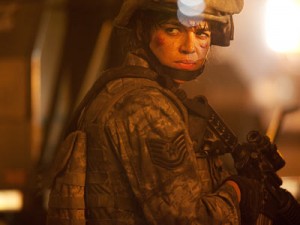 The problem lies with Liebesman’s strategy, something he’s struggled with on his other films as well (The Texas Chainsaw Massacre: The Beginning, The Killing Room, Darkness Falls). He works with a small, promising idea, like The Killing Room’s** notion that the government’s MK Ultra human testing continues to this day, stretching the limits of how much fear and violence a person can take before they crack, and then stops there. Each of his films has no overall plan or structure***, so the scenes could play in any order and it wouldn’t matter. Battle: Los Angeles can’t build tension or expectation of entertainment because it has no idea what it is apart from an alien invasion movie. How can I care about the various military film clichés if none of it really matters because Liebesman hasn’t even bothered to provide the back half of the cliché? Is the inexperienced virgin going to pop his cherry both in war and in bed? Will the soon-to-be-married guy live to go wedding cake shopping and experience his dream life with his beautiful wife? And on and on. The camera shakes a lot, people shoot, die, and nothing that happens during the fighting reminds us of who any of these people are either as a character or an actor.
The problem lies with Liebesman’s strategy, something he’s struggled with on his other films as well (The Texas Chainsaw Massacre: The Beginning, The Killing Room, Darkness Falls). He works with a small, promising idea, like The Killing Room’s** notion that the government’s MK Ultra human testing continues to this day, stretching the limits of how much fear and violence a person can take before they crack, and then stops there. Each of his films has no overall plan or structure***, so the scenes could play in any order and it wouldn’t matter. Battle: Los Angeles can’t build tension or expectation of entertainment because it has no idea what it is apart from an alien invasion movie. How can I care about the various military film clichés if none of it really matters because Liebesman hasn’t even bothered to provide the back half of the cliché? Is the inexperienced virgin going to pop his cherry both in war and in bed? Will the soon-to-be-married guy live to go wedding cake shopping and experience his dream life with his beautiful wife? And on and on. The camera shakes a lot, people shoot, die, and nothing that happens during the fighting reminds us of who any of these people are either as a character or an actor.
Liebesman’s initial mistake was in starting the film in the middle of an action scene, beginning with intensity, and then backtracking to a day earlier, so we can get our flashback to mundanity. It makes us grow impatient, especially as we never get much of a sense of the military’s strategy in fighting off the invaders.
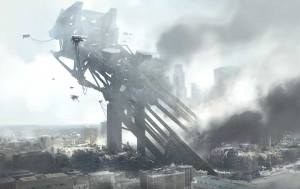 I don’t need a blueprint, but in trying to bridge the gap between the “you-are-there” style of Cloverfield and the broader and larger view of Independence Day, we end up with neither. So it’s not clear what’s going on and the camera shakes around a lot, but we also get a shot here and there of the digital villains. I get that “war is hell” and confusing and not pretty, but the lack of strategy about what we’re supposed to enjoy in the film is more depressing than the situation the characters find themselves in. Battle: Los Angeles ends up being ugly, bereft of creative kills, not scary, not entertaining, not thrilling, not bad enough to be funny, and not short enough to suffer through. If there’s one positive thing to come out of the whole experience, it’s that, because of the alien invasion, at least that guy didn’t have to go shopping for wedding cakes.
I don’t need a blueprint, but in trying to bridge the gap between the “you-are-there” style of Cloverfield and the broader and larger view of Independence Day, we end up with neither. So it’s not clear what’s going on and the camera shakes around a lot, but we also get a shot here and there of the digital villains. I get that “war is hell” and confusing and not pretty, but the lack of strategy about what we’re supposed to enjoy in the film is more depressing than the situation the characters find themselves in. Battle: Los Angeles ends up being ugly, bereft of creative kills, not scary, not entertaining, not thrilling, not bad enough to be funny, and not short enough to suffer through. If there’s one positive thing to come out of the whole experience, it’s that, because of the alien invasion, at least that guy didn’t have to go shopping for wedding cakes.
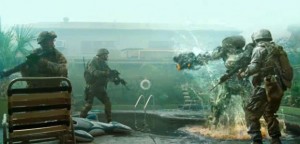 * There’s a detail about Eckhart that’s glossed over that’s a major trend in recent action films, specifically Faster and Drive Angry. In Battle: Los Angeles we see him driving a 1970s muscle car.
* There’s a detail about Eckhart that’s glossed over that’s a major trend in recent action films, specifically Faster and Drive Angry. In Battle: Los Angeles we see him driving a 1970s muscle car.
** Spoiler for The Killing Room: Battle: Los Angeles could almost be the set up for the never-to-be-made sequel to The Killing Room, if we assume that Nick Cannon’s character made it through each stage and was ready to be a civilian suicide bomber, a situation that comes up a few times in Battle: Los Angeles as the Marines sacrifice themselves for the greater good and take one for the team to blow up some aliens.
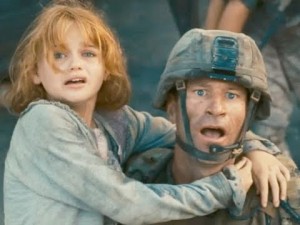 *** Liebesman also never develops his characters. The Killing Room has a number of potential backstories that go unexplored, but are then cast aside. Battle: Los Angeles’s characters don’t even have any real conflicts, even the civilians are pure and wonderful, and more than happy to be swept aside for more murky gunfights with metal dots in the distance. Walter Hill (The Warriors, Streets of Fire, The Driver, 48 Hrs.) also never developed backstories in his action films, deliberately, because he believed his heroes and villains would be defined by their actions. Maybe that’s what Liebesman was after, but Hill’s films are colorful, have quick pacing, and well-directed action sequences, often using a deceptively simple musical score to underline everything. Liebesman appears to have none of those gifts.
*** Liebesman also never develops his characters. The Killing Room has a number of potential backstories that go unexplored, but are then cast aside. Battle: Los Angeles’s characters don’t even have any real conflicts, even the civilians are pure and wonderful, and more than happy to be swept aside for more murky gunfights with metal dots in the distance. Walter Hill (The Warriors, Streets of Fire, The Driver, 48 Hrs.) also never developed backstories in his action films, deliberately, because he believed his heroes and villains would be defined by their actions. Maybe that’s what Liebesman was after, but Hill’s films are colorful, have quick pacing, and well-directed action sequences, often using a deceptively simple musical score to underline everything. Liebesman appears to have none of those gifts.



